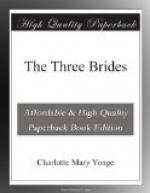“Then you’ve been!” cried his wife.
“As a boy, yes.”
“Not since you were old enough to think it over?” said Anne eagerly.
“No. It seemed to me that the amount of genuine interest in the sport and the animals was infinitesimal compared with the fictitious excitement worked up by betting.”
“And what’s the harm of betting when you’ve got the money?”
“And when you haven’t?”
“That’s another question.”
“Do you approve it at the best?”
“It’s a man’s own concern.”
“That’s arguing against your better sense.”
“Can’t be helped, with two such solemn companions! There would be no bearing you if I didn’t take you down sometimes, when you get so didactic, and talk of fictitious excitement, indeed! And now you are going to Rood House, what will you be coming back?”
Rood House stood about two miles on the further side of Backsworth. It was an ancient almshouse, of which the mastership had been wisely given to Dr. Easterby, one of the deepest theological scholars, holiest men, and bravest champions of the Church, although he was too frail in health to do much, save with his pen, and in council with the numerous individuals who resorted to him from far and wide, and felt the beautiful old fragment of a monastic building where he dwelt a true court of peace and refreshment, whence they came forth, aided by prayer and counsel, for their own share of the combat.
Julius Charnock had, happily for himself, found his way thither when his character and opinions were in process of formation, and had ever since looked to Rood House for guidance and sympathy. To be only fourteen miles distant had seemed to him one great perfection of Compton Poynsett; but of course he had found visits there a far more possible thing to an unoccupied holiday son of the great house than to a busy parish priest, so that this opportunity was very valuable to him.
And so it proved; not so much for the details as for the spirit in which he was aided in looking at everything, from the mighty questions which prove the life of the Church by the vehement emotion they occasion, down to the difficulties of theory and practice that harassed himself—not named, perhaps, but still greatly unravelled.
Those perpetual questions, that have to be worked out again and again by each generation, were before him in dealing with his parish; and among them stood in his case the deeper aspects of the question that had come forward on the drive, namely, the lawfulness and expedience of amusement.




